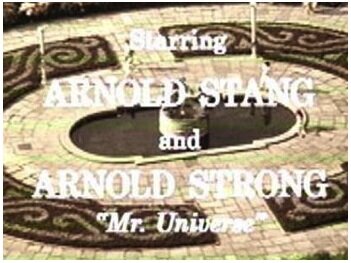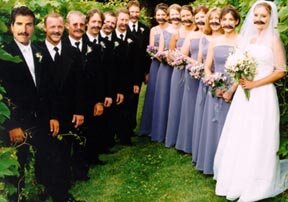Via Thrilling Days of Yesteryear, I see that veteran character actor (and the man from whose dandruff Eddie Deezen was cloned) Arnold Stang has passed on to the great adenoidal void at the age of 91. One of the films Ivan mentions which Stang appeared in, and hopefully won’t be remembered for, is Hercules in New York, which we subjected to the treatment back in 2007. Therefore, consider this, if you will, a tribute, rather than a rerun.
Hercules in New York (1970)

You can tell your film career isn’t off to an auspicious start when you’re playing the title character, and you still get second billing behind the voice of Top Cat.
Our story opens at the summit of Mount Olympus, where the Greek gods, in their limitless wisdom, have chosen to live on the steps of a community college library on Long Island. Arnold Schwarzenegger (”Arnold Strong” in the credits) is Hercules, a demi-god celebrated in myth and ballad for his ability to recite lines phonetically. On earth, Hercules was lauded as the mightiest of warriors, while on Olympus he is chiefly famous for showing off his veiny, trunk-like thighs in a side-slit mini skirt.
Hercules is bored in the realm of the gods, but Zeus will not permit him to visit earth, because, “these mortals are bedeviled by as aggravating a collection of annoyances as it’s possible for one to imagine,” so adding Arnold to the situation would just be gilding the lily. When it’s pointed out to Hercules that he’s only a demi-god anyway, and should quit putting on airs, Arnold slowly recites, “My father may have been a mortal, but you Zeus, my father, are a god.” So, Hercules Has Two Daddies.
Under the circumstances it’s forgivable that the star doesn’t understand English, but you’d think that kind of thing would have disqualified the screenwriter. Especially since he then starts mixing up the Greek and Roman pantheons (Zeus is king of the Gods, but is married to Jupiter’s wife, Juno, which doesn’t make any sense unless we happened to catch the gods while they were competing on the hit ABC reality series, Wife Swap.). Finally, Herc can’t stand it anymore and jumps off the mountain. He lands on the wing of a Pan-Am airliner, pausing just long enough to scare the crap out of William Shatner, before hopping off again.
Hercules splashes down, and the next thing we know, he’s aboard a tramp freighter—naked and glistening—toweling his massive physique in front of the crew and their flinty-eyed captain. If the filmmakers had chosen this moment to give up on the whole ancient-hero-in-modern-times scenario, and just make a gay porn version of Jack London’s “The Sea Wolf,” I think we all would have been a lot better off.
Unfortunately, they stick to their game plan, and Hercules jumps ship in New York. In keeping with the classic myths, he immediately encounters pretzel vendor Arnold Stang, whom the filmmakers call, with malice aforethought, “Pretzie.” At first glance, they would seem to have little in common—the wormy, adenoidal peddler and the unintelligible slab of waxed beef—but they bond over their equally annoying voices.
Herc and Stang embark on one of those Legendary Journeys that Kevin Sorbo milked for four years in first run syndication. Except, instead of engaging in epic battle with Cerberus or the Nemean Lion, Hercules pits his brawn against a junior college track and field team working out on a softball diamond in the Sheep Meadow, because the special effects budget is a little skimpy.
Meanwhile, comely co-ed Helen and her father, The Professor, sit in the bleachers watching her track star boyfriend, Rod. Helen, with her pert nose and long, center-parted brunette hair does a credible job of pretending to be Ali McGraw, but then blows it later in the film by refusing to die of leukemia.
Helen invites Herc and Stang over for tea. When Rod arrives arrives, Hercules asks, “is he your lover?” Both Rod and Helen are scandalized (in 1970, the Sexual Revolution was going strong in bohemian haunts like Fresno and Wheaton, Illinois, but apparently it had yet to hit Manhattan). Rod demands satisfaction, but since they appear to be filming in the producer’s grandmother’s apartment, and Grandma has lots of porcelain knick-knacks, they can’t afford to stage a fight scene. So Hercules violently yanks Rod off his feet, and then cradles him gently against his bosom, while Helen screams and Stang hops up and down. And thus does this battle take its place amongst the legendary Labors of Hercules—the slaying of Anteus, the destruction of the many-headed Hydra, and the breast-feeding of Rod.
Naturally, Helen immediately agrees to have dinner with Herc, and later to take a ride in a hansom cab through Central Park. Suddenly, a man in the worst bear costume since Santa Claus Conquers the Martians appears beside the cab. Herc immediately leaps out and begins an inter- (or intra-) species smackdown. Helen screams, “Beat him up!” She’s off camera, so it’s not clear whom she’s addressing, but one assumes it’s the bear. She watches the two ursine antagonists wrestle for a moment, then has an orgasm (no, I’m not kidding) and falls back against the upholstery, spent and dewy.
Arnold finally works his hand inside the costume, but can’t find a breast, and he goes berserk, beating the ersatz bruin into a bathmat. Instantly, the WWE comes calling, and a newspaper from one of those Make Your Own Headline booths at Coney Island informs us that Hercules is now Champion of the World.
Meanwhile, on Mount Olympus, Zeus sits upon his throne, serene and majestic, except when a co-ed who’s late for an eight o’ clock class runs down the steps and clips him in the head with her backpack. Otherwise, all is well in the mystical abode of these all-powerful beings, as demented young women in filmy togas run around on the grass, bouzouki tapes from a Greek restaurant play relentlessly on the soundtrack, and Audra from The Big Valley serves cocktails.
Unfortunately, down on earth, Hercules is consorting with Vince McMahon, pretzel salesmen, and Ali McGraw impersonators, so Zeus orders Mercury to take Hercules a Pick-Me-Up bouquet. Ah, the viewer senses, at last, the filmmakers will deliver a battle royale between two legendary warriors endowed with powers of cosmic proportion! Let the combat commence!
Cut to Hercules, who takes some snapshots at Rockefeller Center, then has coffee and a bagel at the Automat. Mercury, having apparently missed his cue for the fight scene, finally shows up and stages an intervention. Herc takes it about as well as Charlie Sheen usually does, and Zeus dispatches Nemesis to open an amphora of whup-ass on Hercules. But Juno intercepts Nemesis, and gives her a mood ring that will render Hercules both mortal and mellow.
Stripped of his demi-divinity, Herc is now vulnerable to Juno’s malice. She immediately sets in motion a cunning plan to kill Hercules by…I’m not sure, actually. It has something to do with Hercules losing a weight lifting contest on a TV variety show that’s filmed in front of a shower curtain. And even though we’re not sure what the hell is going on, we suspect that no good can come from this, since nothing good has come from anything else in the movie, especially the opening credits. Anyway, during the power lifting, Hercules sustains a rupture of heroic proportions, and is forced to flee the TV studio, clutching his groin and pursued by the Mafia.
In the Elysian environs of Olympus, Great Zeus is displeased by this turn of fate. At least, I think he is—it’s hard to tell, because most of the dialogue is being drowned out by the sound of nearby cars honking.
Herc runs outside and just happens to discover an unattended chariot parked at the curb (well, they’re easier to find at rush hour than a cab). Herc cracks the whip and drives his two-horse two-wheeler through Times Square (passing a movie theater showing Easy Rider), and then he cruises aimlessly around for awhile, rendering it unclear whether the movie is ripping off the chariot race from Ben-Hur, or the Amish buggy scene from Witness.
Thanks to a jump cut, Herc is now in Central Park, where Helen and the Professor are being chased down by Mobsters, one of whom has apparently borrowed his mom’s station wagon for the day (sure, the modern capo shows a predilection for late model black sedans, but in 1970 the Mafia’s car of choice was apparently the cream-colored Country Squire).
By this time, however, the wheels are coming off the chariot (as well as the movie), so our hero and Pretzie jump into the backseat of the Professor’s car. Almost instantly, Helen shouts, “We’re out of gas,” followed by a moment of pure terror as we realize the rest of the movie may consist of Herc and Stang making out.
Mercifully, they go into a warehouse instead, where Hercules gets his ass kicked by a pick-up group of thugs. Suddenly, Atlas and Sampson appear! Or rather, a beefy guy wearing the bottom half of a monk’s habit, and another dressed like Fred Flintstone show up, and start smacking around the crooks while our hero scrambles onto a pile of boxes and cowers.
(By the way—Sampson? It’s one thing to mix up the Greek and Roman gods into some kind of Reese’s Peanut Butter Pantheon, but now we’ve got characters out of the Old Testament? Who’s going to show up next? Gilgamesh? Jesus? The Dukes of Hazard?)
Anyway, Herc gets his strength back and immediately rips off Sampson’s act by pushing over two stacks of empty cardboard boxes, which apparently frightens off all the thugs, because suddenly the fight is over.
We cut to Olympus, where Hercules is concluding the tale of his earthly adventures. “It all sounds revoltingly noisy,” Juno sniffs, and we’re forced to agree, since she has to shout to be heard above the off screen traffic.
So there you go, fans of 300 and Victor Davis Hanson. To the ancient Greeks, heaven is filled with scheming, immortal harridans and mini-skirted lummoxes who talk like Madeline Kahn in Blazing Saddles. On the bright side, Mount Olympus — judging by the soundtrack – is convenient to schools, shopping, and the Long Island Expressway.
R.I.P., Pretzie.
Movies, Reruns | 15 Comments »
 Amazon offered the following party planning notion in an email yesterday, and if I had any doubts about who the online retailing giant likes better, me or Sting, this pretty much clears it up. Still, I’m trying to take their suggestion in the spirit in which it was offered, but I can’t figure out how to virtually flip them off (I’m sure there’s an appropriate emoticon, but giving someone the finger digitally just seems redundant). So instead of watching The Bride again (because, what with working on the sequel and all, we have fresh hells to visit), I thought I’d put on a little Kool and the Gang and just post our summary of it from .
Amazon offered the following party planning notion in an email yesterday, and if I had any doubts about who the online retailing giant likes better, me or Sting, this pretty much clears it up. Still, I’m trying to take their suggestion in the spirit in which it was offered, but I can’t figure out how to virtually flip them off (I’m sure there’s an appropriate emoticon, but giving someone the finger digitally just seems redundant). So instead of watching The Bride again (because, what with working on the sequel and all, we have fresh hells to visit), I thought I’d put on a little Kool and the Gang and just post our summary of it from .

